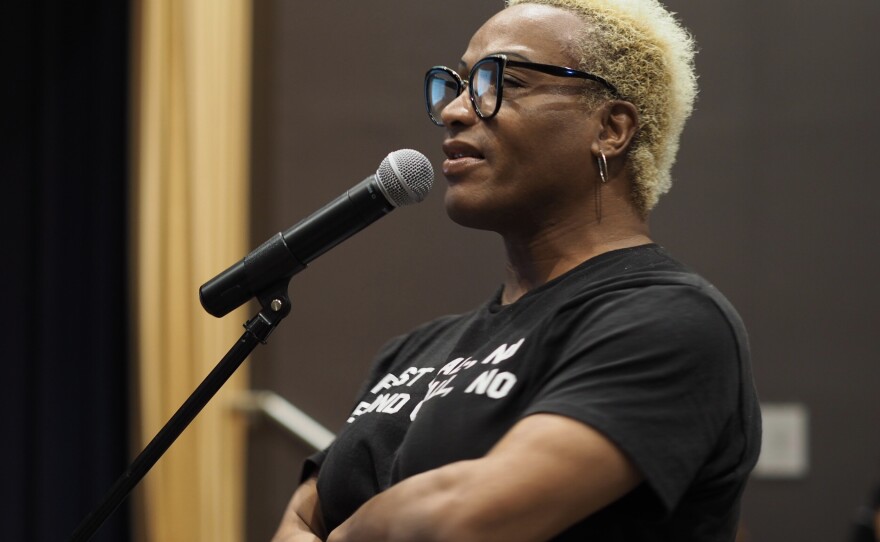Jacksonville Sheriff Mike Williams on Thursday announced a team of officers have volunteered as LGBT liaisons with the goal of helping police better communicate with the LGBTQ community.
He made the announcement as LGBT advocates gathered downtown for a chance to voice their concerns. After more than five months of vigils and protests surrounding a series of shootings of transgender women, Williams had agreed to the community meeting.
He said nine or so officers across departments have stepped forward to be part of the new liaison program.
“Quite frankly there was hesitancy on my part because how many teams are we going to have to establish?” Williams said in an interview with WJCT News. “However, it shouldn’t take a crisis like this, but because of this crisis, I think the team is an absolute necessity today.”
Since February, four transgender women have been shot in Jacksonville, three of them fatally. They account for about a fifth of the 16 transgender murders nationwide this year, as tracked by the Human Rights Campaign.
Advocates like those at the meeting Thursday had criticized JSO’s publicly identifying the victims as men and using their legal names instead of their chosen names. JSO has previously said it IDs victims based on the medical examiner’s report.
However, most recently, a JSO email to news media referred to “a transgender victim” and listed several names she had used, a departure from previous notifications.
Williams told WJCT during the meeting that JSO wouldn’t intentionally disrespect a victim.
“I think it was maybe potentially just a — maybe a lack of sensitivity on our part to address it that way,” Williams said. “So after the fact, in some of the other cases, follow-up cases, there’s an investigative benefit to identifying someone by the way they were identified in the community.”
He added that police officers don’t immediately know how victims identify if they’re deceased and victims’ legal names will still be listed on official documents.
Williams said JSO is also developing officer training materials focused on “concerns of minority communities” through the ACLU, and that effort began before the community outcry.
During the meeting, advocates walked up to a mic to voice their concerns. Founder of the Transgender Awareness Project Paige Mahogany Parks asked why the sheriff’s office hasn’t issued an apology to the transgender community.
“You guys have misgendered us in social media, in the media and there hasn’t been a response yet to that,” she said.
Another speaker shared a story about being attacked and her experience with police as a transgender woman. Others asked for JSO to include a transgender person on its liaison team and some wanted to know what the liaison team will be responsible for changing.
A task force on community engagement, which Sheriff Mike Williams convened, had recommended JSO should appoint an LGBT liaison in late 2016, as well as liaisons for other groups, including the Hispanic population. None of those appointments were made.
Instead of formal liaisons, JSO had established what’s called the Sheriff’s Watch program, citizen-led groups who meet monthly to discuss law enforcement matters.
Since the first murder, advocates had also been calling on JSO to require more officer training around transgender issues and amend its policies.
Williams said any staff member can bring recommendations to him.
“I know we’ve talked about in prior meetings training issues and things like that that we’re going to bring to the table,” he said.
Earlier this year WJCT reported on how Seattle police created policies about transgender identification, and it started with an LGBT liaison, Officer Jim Ritter.
“Having a liaison helps bridge that gap to a community which has not always trusted the police,” Ritter said in February.
He helped institute a policy of calling transgender people — whether suspects or victims — by their preferred pronouns and names, even if they haven’t been legally changed. And he produced an 18-minute training video Seattle officers are required to watch.
Lindsey Kilbride can be reached at lkilbride@wjct.org, 904-358-6359 or on Twitter at @lindskilbride.







